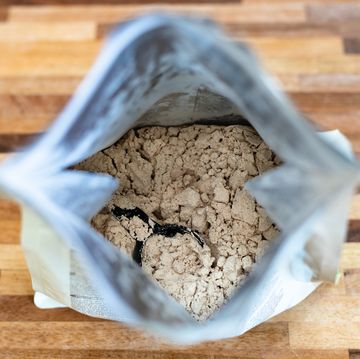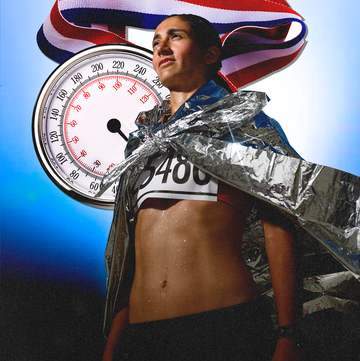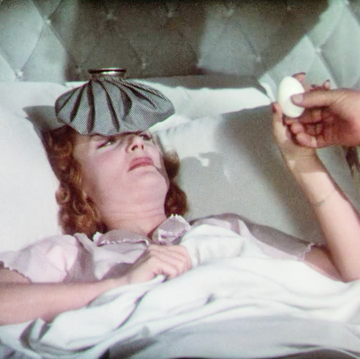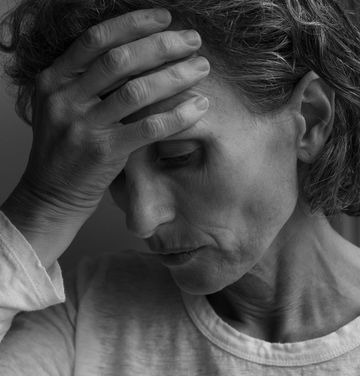One puff, maybe two, is all it takes. Within minutes, Jessica's breathing is more regulated and her anxiety subsides. "I'm finally able to feel hungry instead of nauseous and uncomfortable," says the 31-year-old from Denver, who asked that Cosmopolitan.com use only her first name. Jessica admits to smoking marijuana as often as four to six times a week and swears by the drug in helping her battle anorexia.
Much like meditation, Jessica says cannabis helps her slow her mind and observe her disordered thoughts, rather than get carried away by them. "I'm able to step back and see my irrational thoughts for what they are — irrational — and it gives me the space to look at it and go, 'Wow, that's a ridiculous thought to have; nothing bad is going to happen to me if I eat this piece of pizza,'" she says. "It also makes food taste better and eating more enjoyable, which is nice because chronic anorexia messes with your digestive tract and can sort of break your natural hunger cues."
As for post-munchies guilt, Jessica hasn't experienced it when the high wears off. "I don't have the body image distortion issues that some people with eating disorders have," she explains. "Anorexia is a control thing for me — excessive perfectionism — so it's a relief to have something that allows me to let go and be more flexible."
Claire*, 21, a college student in Seattle, also credits marijuana for helping her let go of the obsessive calorie counting that drove her eating disorder. The first time she smoked, she got the munchies and ate, but the drug re-sorted her memory in a way that made it impossible to remember her calorie counts the next day. "I felt bad and guilty at first, but I noticed I felt good physically and it also felt good to rebel against my harmful thoughts," Claire says. "Since I'd already lost track, I figured it couldn't hurt to go two days without counting, and so I started smoking more regularly and I haven't counted calories since."
Both women say they don't smoke huge amounts or get super high, just a small hit to take the edge off. "Some days, I wake up feeling really anxious and nauseous," Jessica says. "I can't smoke at work, so I'll struggle through the day, and then have one or two hits off of my vaporizer pen when I get home to calm the anxiety and stimulate my appetite so I can eat dinner."
These stories don't surprise Sona Patel, an L.A.-based physician who has been recommending medical marijuana for nine years under California Proposition 215. (Her website is Doc420.) "Treating anorexia involves many components, one of which is restoring the person to a healthy weight, and medical marijuana can help by increasing the patient's appetite," she says, adding that it also helps alleviate anxiety for people with eating disorders. Patel has seen a rise in the number of anorexia patients seeking help from marijuana in recent years. "Their success stories have become inspiration for other patients with anorexia who now feel confident in turning to medical marijuana as a cure," she says.
Medical marijuana is now legal in 23 states and the District of Columbia. (Only four of these states explicitly list anorexia as a qualifying condition, but all include health issues associated with the eating disorder such as nausea, anxiety, and uncontrolled weight loss.) What's more, a record 53 percent of Americans now favor the legalization of marijuana, according to a Pew Research Center study.
This change in public opinion has coincided with a growing body of research that supports the medicinal properties of the plant. New studies suggest cannabis may be effective in treating epilepsy seizures, neuropathic pain, and glaucoma, reducing multiple sclerosis stiffness, and even shrinking aggressive brain tumors.
While stoner movies have long portrayed the power of "the munchies," it was only recently researchers discovered why the drug has this effect. A 2014 animal study in Nature Neuroscience suggests an active ingredient in the cannabis plant that makes you feel high, known as tetrahydrocannabinol (or THC), activates receptors in the brain linked to odor processing, which may increase our ability to smell and taste.
The "munchies" effect is the reason medicinal marijuana gained acceptance as an alternative treatment for cancer and HIV patients struggling with nausea and loss of appetite, but its role in treating anorexia nervosa may be more complicated. In addition to lack of appetite, sufferers often have a deep fear of food, severe body distortions, and an excessive need for control. "They feel power in not giving in to the desire to eat, so stimulating their appetite can't necessarily overcome the neurobiological issues that are also intimately involved with their disorder," says Tamara Pryor, director of clinical research at the Eating Disorder Center of Denver. "That said, marijuana may be a helpful tool for some people — in conjunction with therapy."
So far, research on marijuana and anorexia nervosa is scarce. A 30-year-old study found cannabis was not an effective treatment and could even cause psychic disturbances in some patients, but a 2013 Danish studyfound the use of a synthetic cannabinoid, dronabinol, led to small but significant weight gain in anorexia nervosa patients, and a 2013 study from Katholieke University in Brussels found cannabinoids helped anorexia-stricken mice recover and return to a healthy weight.
Though the anorexia sufferers say they use the drug to calm anxiety so they can eat, Gina Bongiorno, an adult program therapist at the University of California San Diego Eating Disorders Treatment program remains skeptical of this strategy. "If someone has to rely on marijuana to reduce their anxiety and get through a meal, then they are never learning how to regulate their emotions and lose the opportunity to heal their primary issues."
Patel doesn't share these concerns. "It is possible patients could use medical marijuana as an escape from their emotional issues, but for certain conditions such as PTSD, PMDD, depression, etc., this is the effect that patients are seeking," she says. "Even conventional prescription medications do not provide a cure, only an improvement in symptoms, which is what medical marijuana also provides."
Jennifer Doucette, 21, does worry about marijuana becoming a crutch. The native of British Columbia, where medical marijuana was legalized in 2000, began smoking the drug two years ago to treat symptoms of her anorexia. While she says it helps her increase her appetite and reduce anxiety, she doesn't like the idea of using it long-term — or the fact that she needs to use it multiple times a day. "I'm not sure I know who I am without it anymore, and that kind of scares me," she says. In June, Doucette entered a seven-week in-patient treatment program in hopes of curing her anorexia once and for all. The program does not allow the use of marijuana. "I'm nervous about how I'll cope without it, but I really want to have a healthy relationship with food and I want to find a way to do it on my own," she told Cosmopolitan.com before entering the program.
For many, including Doucette, marijuana has been a welcome alternative to the psychotropic drugs so often prescribed to anorexics, who commonly suffer with co-occurring conditions such as obsessive compulsive disorder, depression, and other anxiety disorders. "Doctors tried recommending prescription drugs for my anxiety, but I'd been on medication before and hated it," she says. "I've never liked the idea of needing a pill to feel normal; at least weed is natural, it comes from the ground, it feels safer."
Jessica, too, prefers marijuana over medication. "Prozac and Lexapro took away my anxiety, but they made me feel numb, apathetic, and flat, just like my eating disorder," she says. "Marijuana does the opposite. It heightens my senses and makes me feel more connected with my emotions and the world around me."
While cognitive behavioral therapies are the primary treatment method for eating disorders, as many as 53 percent of anorexia nervosa patients are prescribed psychotropic medications, according to the International Journal of Eating Disorders. A small 2008 study in the American Journal of Psychiatry found the antipsychotic Olanzapine was helpful in achieving more rapid weight gain among women with anorexia nervosa, but a more recent meta-analysis in the Journal of Clinical Psychiatryfound no evidence that any antipsychotics were beneficial in the treatment of anorexia nervosa.
"Sadly, we still haven't figured out exactly how to treat anorexia, and there's never been any form of psychopharmacotherapy that's proven to be effective for it," says Pryor at the Eating Disorder Center of Denver. "While it is important not to jump to any conclusions about cannabis, I think we need be willing to explore new possibilities because what we've been doing isn't really working."
The clinic where Pryor works is an abstinence-only program — meaning they do not admit patients who are dependent on drugs or alcohol — but Colorado's legalization of marijuana caused their policy to evolve. Though cannabis use is still not encouraged, it no longer prohibits patients from participating if they use the drug outside the program. "Now, if an individual says it relaxes them, we listen without judgment to find out what that means: Does it help them check out so they don't have to experience emotions, or does it decrease anxiety that then helps them face the food and their disorder?" Pryor says.
Negative side effects from cannabis are rare but can happen. "We've had to take some patients off the drug completely or wean them down to smaller doses because it wasn't helping their eating or anxiety, and was interfering with their ability to get treatment," Pryor says. "Other patients have experienced cannabis-induced panic attacks, intense paranoia, and we had one patient suffer a strange condition called cannabinoid hyperemesis syndrome — which is characterized by nausea, vomiting, and compulsive bathing in hot water due to marijuana use."
Another problem: Lack of quality control. Counties and cities are often on their own to figure out how to enforce various rules for the prescription drug, leaving very little oversight of the industry. "Medical marijuana is not regulated by the FDA, so whether you buy it on the street or in a dispensary, your doctor has no way of knowing what's in it," says Bongiorno at University of California San Diego Eating Disorders Treatment program. "It's more difficult to effectively monitor than the medications they can prescribe with specific knowledge of dosage and ingredients."
While doctors like Patel of Doc420 approve medical marijuana cards for anorexic patients, it's illegal for them to be affiliated with a dispensary. As a result, they have no involvement in where the drug is purchased and may not see a patient again until they want to renew their card a year later. "I always recommend vaporizers or edibles — which are the safest methods to consume because the least amount of toxins and chemicals are ingested — but I'm unable to recommend specific strains or dosages since each dispensary is independently owned and carries their own strains with various strengths," Patel explains.
Patel says she's found most problems associated with marijuana are easily remedied by changing strains. Strains labeled "Cannabis sativa" usually have a stimulating effect, while those labeled "CBD" or "Cannabidiol" are non-psycho active and more sedative. As a result, sativa strains can be good for someone with depression but could trigger panic attacks in someone with anxiety. Overall, she says her patients have reported far fewer issues than they did with prescription medications. "When I write a recommendation for medical marijuana, I no longer worry about what side effects my patient could have or when to schedule a blood test to make sure the medication isn't damaging their organs or if my patient could have a fatal reaction from the medication," she says.
In April, Pryor spoke at the International Conference on Eating Disorders (ICED) about her experiences treating eating patients using cannabis — a move that made many of her colleagues nervous. "I feel like I'm going out on a limb just talking to you about this, but I think it's important for clinicians keep an open mind," she says. "We often call out our patients for rigid and obsessive thinking, but we in the medical field often turn around and do the same thing."
To her surprise, the speech was so well received that she had to stay long after her presentation to answer additional questions. "It gives me hope that changing attitudes and new medical marijuana legislation will begin to eliminate barriers to important medical marijuana research."
*Name has been changed
Follow Kelly on Twitter.

Kelly Mickle is an ASME award-winning journalist with more than a decade of experience covering health, lifestyle and culture. She previously worked as an editor for Self magazine, is a cofounder of towwn and has written for Glamour, Women’s Health, Cosmopolitan, Sunset and more.












